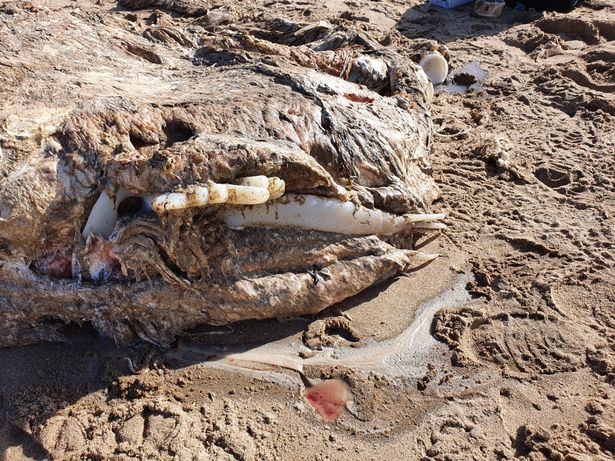Scientists are studying a mysterious sea monster that appeared in Wales and measures more than 23 feet (7 meters) long, weighs an estimated 4 tons and has no face, in an attempt to discover its true identity.
The huge creature was found in Broad Haven South Beach in Bombrokshire, Wales, last week, and was reported to the Department of the Investigation of Sea Creature Suicide, or CSIP, in the United Kingdom.
But as the mysterious beast disintegrated, experts were unable to identify it, and now a sample of it must be sent for testing.
It is very difficult to know the identity of this creature for sure, "because it is so decomposed," said Matthew Westfield, a member of the CSIB team. It died in the sea a long time ago before it was washed away by the water on the shore, so it is possible that it arrived with the tide. .
There is no clear characteristic of the creature's biology, as the head appears to have disappeared and no limbs are visible, and although Westfield identified a spine about 23 feet long, the scale of the actual animal is uncertain.
Interestingly, this is a fairly reasonable take on a mystery carcass.
The focus is on IDing it as a whale or shark, not a "monster".
Mystery 23-foot sea beast weighing four tonnes found on beach in Wales https://t.co/0d2RrPHjG4
- Sharon of the Strange Times 🌋 (@IDoubtIt) March 3, 2021
"Basically the whole head was either decomposed or missing," he said. "However, the examination of the remains provided some evidence."
"Basically I got a report about something huge that was washed up on the beach. The woman who actually told us about it did a little research and came back at first saying that she thought it might have been a shark. In pictures, we didn't think so at first because of its size and because it's rare for fish to be engulfed." The beaches shark around Wales. So at first we thought it was going to be a whale, but when we arrived and we tested it, it became clear that it was definitely not like that. "
"The first clue was the smell of rotten fish. The smell of decomposing fish differs from the smell of decomposing whales. We took pictures, took some samples, and sent them to the Natural History Museum and some specialized teams there, along with the London Zoo."
"We just have to wait and see what happens. As for the cause of death, it is possible that he will never know it. It is absolutely impossible to determine the cause of his death," he added.
The research team indicated that the remains must now either be buried wherever they are, removed from the shore in small pieces or left to nature.

